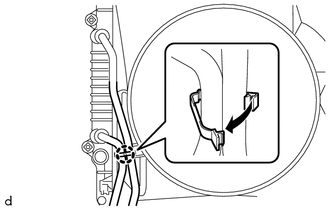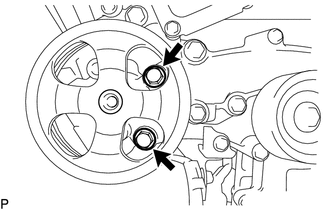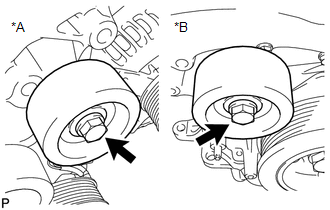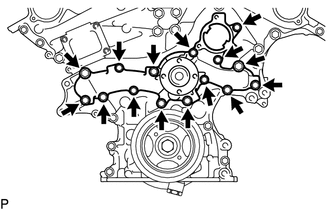Toyota Tacoma (2015-2018) Service Manual: Removal
REMOVAL
PROCEDURE
1. REMOVE WATER INLET WITH THERMOSTAT SUB-ASSEMBLY
(See page .gif) )
)
2. REMOVE NO. 1 RADIATOR HOSE
.gif)
3. REMOVE NO. 2 RADIATOR HOSE
.gif)
4. DISCONNECT RADIATOR RESERVE TANK HOSE
.gif)
5. SEPARATE TRANSMISSION OIL COOLER HOSE (for Automatic Transmission)
|
(a) Disengage the clamp to separate the 2 transmission oil cooler hoses from the fan shroud. |
|
6. REMOVE FAN SHROUD
.gif)
7. REMOVE COOLER COMPRESSOR ASSEMBLY
(See page .gif)
.gif) )
)
8. REMOVE V-RIBBED BELT TENSIONER ASSEMBLY
.gif)
9. SEPARATE VANE PUMP ASSEMBLY
|
(a) Remove the 2 bolts and separate the vane pump assembly from the timing chain cover assembly. |
|
10. REMOVE NO. 2 IDLER PULLEY SUB-ASSEMBLY
|
(a) Remove the 2 bolts and 2 No. 2 idler pulley sub-assemblies from the timing chain cover assembly. Text in Illustration
|
|
11. REMOVE ENGINE WATER PUMP ASSEMBLY
|
(a) Remove the 15 bolts, engine water pump assembly and gasket from the timing chain cover assembly. |
|
 On-vehicle Inspection
On-vehicle Inspection
ON-VEHICLE INSPECTION
PROCEDURE
1. INSPECT FOR COOLANT LEAK
HINT:
The sliding surface inside the engine water pump assembly is lubricated
by engine coolant. As some engine coolant is d ...
 Installation
Installation
INSTALLATION
PROCEDURE
1. INSTALL ENGINE WATER PUMP ASSEMBLY
(a) Install the engine water pump assembly and a new gasket to the timing
chain cover assembly with the 15 bolts.
Torq ...
Other materials:
Theft Deterrent System is not Unset when Engine is Running
DESCRIPTION
The theft deterrent system is unset when the IG signal and engine speed signal
are input to the main body ECU (multiplex network body ECU) for 2 seconds or more
continuously.
The engine speed signal is sent from the ECM to the main body ECU (multiplex
network body ECU). For this ...
Replacement
REPLACEMENT
PROCEDURE
1. REPLACE AUTOMATIC TRANSMISSION FLUID
(a) Lift the vehicle. [*1]
NOTICE:
Set the vehicle on a lift so that the vehicle is kept level when it is lifted
up (make sure that the tilt angle from the front to rear of the vehicle is within
+/-1°).
(b) Remove th ...
Automatic Disconnecting Differential Motor Limit Switch Circuit (P17A4)
DESCRIPTION
When the A.D.D. actuator switches between 2WD and 4WD, the DL1 and DL2 terminals
of the limit switch and ADD terminal of the A.D.D. position switch change to one
of the following ON/OFF combinations listed in the table below.
Terminal
In 2WD
Switchi ...




